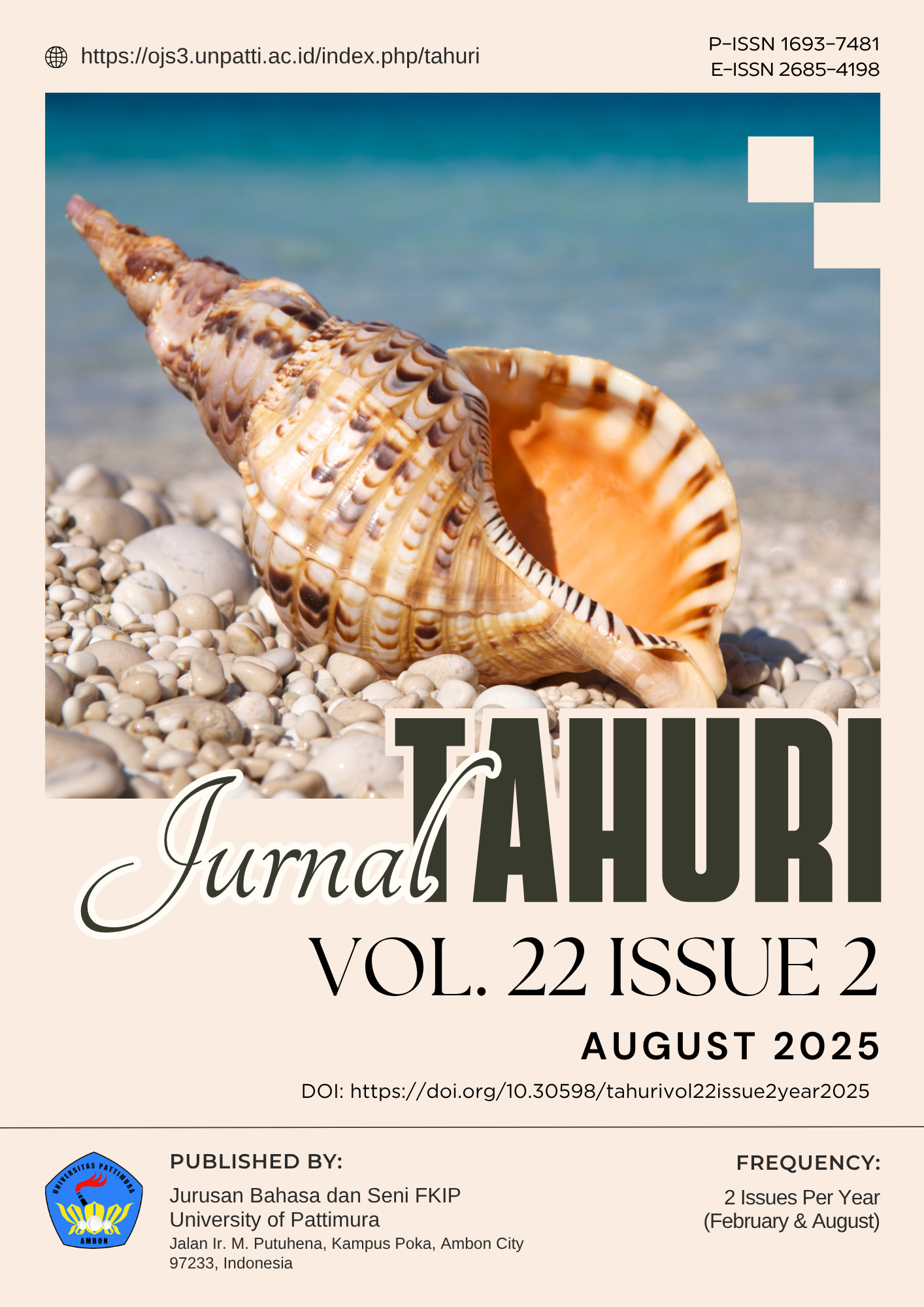| ..: MAIN MENU :.. |
| Register |
| Login |
| Reviewer |
| Focus and Scope |
| Editorial Team |
| Indexing |
| Contact |
| ..: SUBMISSION :.. |
| Author Guidelines |
| Submit Paper |
| Open Access Policy |
| Author Fees |
| ..: PUBLICATION :.. |
| Peer Review Process |
| Publication Ethics |
| Copyright Notices |
| Archiving Policy |
| Crossmark Policy |
| AI Tools Policy |
| Plagiarism |
| ..: ARTICLE TEMPLATE:.. |
| ..: INFORMATION :.. |
| Readers |
| Authors |
| Librarians |
| ..: TOOLS :.. |
| ..: STATISTIC VIEWS :.. |
|
|
| Journal title | Jurnal Tahuri |
| Frequency | 2 issues per year (February and August) |
| DOI | prefix 10.30598 by crossref |
| Print ISSN | 1693-7481 |
| Online ISSN | 2685-4198 |
| Editor-in-chief | Petrus Jacob Pattiasina |
| Publisher | Jurusan Pendidikan Bahasa dan Seni, FKIP, Universitas Pattimura |
| Citation Analysis | Dimensions | Google Scholar | Garuda |
| OAI | https://ojs3.unpatti.ac.id/index.php/tahuri/oai |
Jurnal Tahuri derives its name from a traditional communication medium in Maluku, the bia trumpet (triton), which was once used by customary leaders and village authorities to announce important events or deliver messages to the community. The name reflects the cultural significance of the bia trumpet as a unifying tool in village life, as well as a symbol of local wisdom that has gradually diminished with the advancement of science and technology.
Published by the Department of Language and Arts, Faculty of Teacher Training and Education, Universitas Pattimura Ambon, Jurnal Tahuri presents critical ideas and scholarly studies from academics focusing on theories, concepts, and practices in the fields of education and linguistics. To ensure quality, each issue involves peer reviewers from various state universities across Indonesia.
Manuscripts are published in both Indonesian and foreign languages (with abstracts provided), aiming to serve as a valuable scientific forum for authors, readers, and the broader academic discourse in education and language studies.
Current Issue

The August 2025 issue of Jurnal Tahuri brings together five research articles authored by Indonesian scholars, each contributing to the growing body of work on language, identity, and learning in the context of contemporary Indonesia. This edition explores the intersections of digital culture, educational policy, sociolinguistics, and language pedagogy through both qualitative and quantitative perspectives. The articles in this issue address diverse yet interconnected themes. One study investigates digital gaming as an informal space for English language acquisition, highlighting how Indonesian youth develop identity, interaction, and fluency through online play. Another critically examines policy gaps and classroom realities in Indonesia’s English curriculum, while a sociolinguistic study explores perceptions of linguistic standardness and local features in academic writing among Ambonese students. Complementing these are an empirical exploration of mobile-assisted vocabulary learning via Duolingo across university disciplines, and an analysis of code-switching as a marker of social identity among Chinese-Indonesian students in urban educational settings. Collectively, these studies reflect Jurnal Tahuri’s enduring mission to advance research that bridges technology, culture, and education—promoting a nuanced understanding of how language practices evolve within Indonesia’s multilingual and digitally connected society.



